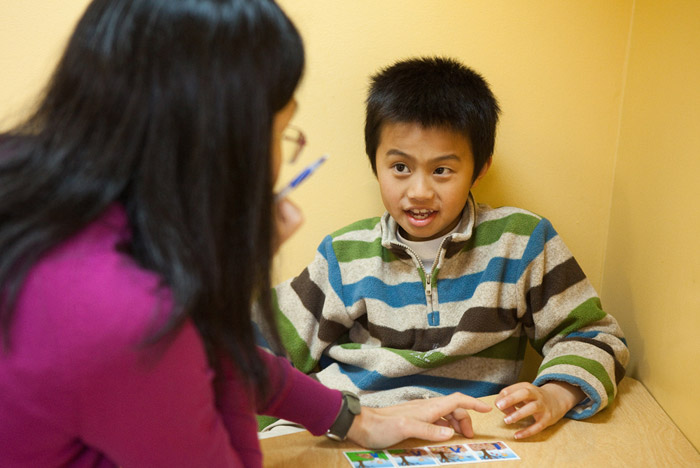What Is an SLP?
Speech and Language Pathologists (SLP) take into consideration the medical, physical, psychological, cultural, and social factors together with other relevant details that may contribute to the communication impairment. A speech and language evaluation takes about an hour and a half. After the evaluation, the SLP will produce a report describing his/her findings and recommendations for treatment.
If speech therapy is recommended, the SLP will create a program to help the individual with the parts of speech and/or language that are troublesome. The parents/caregivers are encouraged to observe the therapy session and support the SLP within the session as well as the goals of therapy in the home environment.
The very nature of communication demands that the SLP work in close collaboration with the child, his/her caregivers/close relatives/friends/colleagues and others coming into regular contact with the child. The people in a child’s life are the ones who will foster language development on a day-to day basis.
How Do I Select a Speech/Language Pathologist (SLP)?

- Your pediatrician can make recommendations
- Your insurance company can provide a list of those SLP s/centers that are covered by your policy
- You can look at the ASHA website (American Speech Language and Hearing Association) and find licensed SLPs in your area
SLPs at the Hearing and Speech Center Provide:
- Assessment and diagnosis of communication impairments due to articulation/ phonological delay/disorder, language delay/disorder, autism, pervasive developmental disorder (PDD), pragmatic disorder, developmental apraxia, oral-motor impairment, hearing impairment, cleft-palate, voice, stuttering, aphasia, apraxia, dysarthria, and other neurological disorders. Evaluations are conducted in a variety of languages. (See staffing section.)
- Provide speech/language therapy, if needed, following a comprehensive evaluation of the child’s communication
- Provide speech/language therapy to children with hearing impairment (For further information on this service, see Deaf/ Hard of Hearing Program.)
- Provide individual and group therapy with emphasis on early intervention
- Provide periodic in-services for families, schools, physicians and referring agencies.
What to Expect on the Day of Evaluation
Before taking your child for a speech and language evaluation, you can help him/her feel comfortable and make the evaluation easier by preparing in advance:
- Let your child know he/she will be talking with a new adult who is like a teacher
- Arrive a few minutes early so they can get used to a new place
- Prepare to stay for up to two hours
- Prepare to discuss any concerns you, your child’s doctor, or teacher have about the child’s speech
- Bring a snack and diapers if they are needed
- Bring a favorite toy, book, snuggle if child wants
- Support the Speech-Language Pathologist when she needs to talk with your child
What to Expect from Speech and Language Therapy
If your SLP determines that your child will benefit from speech therapy services, he/she will describe to you the plan for therapy. Sessions typically take place weekly, with “homework” to continue progress during the week. With each appointment the SLP will let you know how your child is progressing and what you can do at home to help promote speech/language. A supportive environment will help your child build success with their speech and language goals. Goals will periodically be reviewed and updated to reflect the current needs of the child’s communication. After the child is seen for about six months, there will be a review and possible testing to evaluate progress and need for continued therapy.
